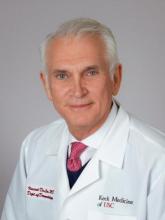In this resident takeover, three dermatology residents -- Dr. Daniel Mazori, Dr. Elisabeth Tracey, and Dr. Julie Croley—recap some of the dermatology issues and controversies that made headlines in 2019. They provide an overview of noteworthy topics such as chemical sunscreen safety, measles and vaccinations, drug approvals, and recalls of popular over-the-counter products and discuss how they have addressed these issues with their patients.
* * *
We bring you the latest in dermatology news and research:
European marketing of Picato suspended while skin cancer risk reviewed
The Food and Drug Administration is gathering information to investigate the safety concern raised in Europe.Frequent lab testing is common, but low-yield, for isotretinoin patients
Low rates of abnormalities can inform clinicians looking for an optimal testing strategy.Celebrating 50 years of Dermatology News
Click the headline above to read our debut issue from January 1970!
* * *
Things you will learn in this episode:
- Laws restricting the sale of chemical sunscreens containing organic UV filters such as oxybenzone were passed in Key West, Fla., as well the U.S. Virgin Islands.
- The Food and Drug Administration asked sunscreen manufacturers to perform additional studies on safety parameters, such as systemic absorption for 12 organic UV filters, to determine if they can continue to be listed as generally recognized as safe and effective. “The FDA is not currently discouraging sunscreen use and is not saying that these 12 organic UV filters that were studied are unsafe, so for now, both physical sunscreens and chemical sunscreens with those organic filters are considered acceptable,” advises Dr. Tracey.
- The measles outbreak in New York City, which was fueled by undervaccinated communities, ended in 2019 after becoming the city’s largest measles outbreak in nearly 30 years. “[Questions about vaccination] probably doesn’t come up in our clinic as much as a primary care provider’s office but it is relevant to many dermatologic conditions and so I think it is our duty when approached with this issue to be advocates for what we know has scientific data to back it up,” states Dr. Croley.
- Dupilumab was FDA approved for adolescent atopic dermatitis, making it the third biologic with a pediatric dermatology indication.
- Trifarotene cream and minocycline foam were approved for treatment of acne in patients 9 years and older.
- Apremilast became the first FDA-approved medication for oral ulcers from Behçet disease.
- Afamelanotide became the first FDA-approved medication for erythropoietic protoporphyria.
- One lot of Johnson’s Baby Powder was recalled because of possible asbestos contamination, but no asbestos was found when the bottles of interest were retested.
- The Neutrogena Light Therapy Acne Mask was recalled because of rare reports of visual side effects from insufficient eye protection as well as risk for potentially irreversible eye injury in patients taking photosensitizing medications or with certain underlying eye conditions.
Hosts: Elizabeth Mechcatie, Terry Rudd
Guests: Daniel R. Mazori, MD (State University of New York, Brooklyn); Elisabeth (Libby) Tracey, MD (Cleveland Clinic Foundation); Julie Ann Amthor Croley, MD (The University of Texas Medical Branch at Galveston)
* * *
Show notes by: Alicia Sonners, Melissa Sears, Elizabeth Mechcatie
You can find more of our podcasts at http://www.mdedge.com/podcasts
Email the show: podcasts@mdedge.com
Interact with us on Twitter: @MDedgeDerm

